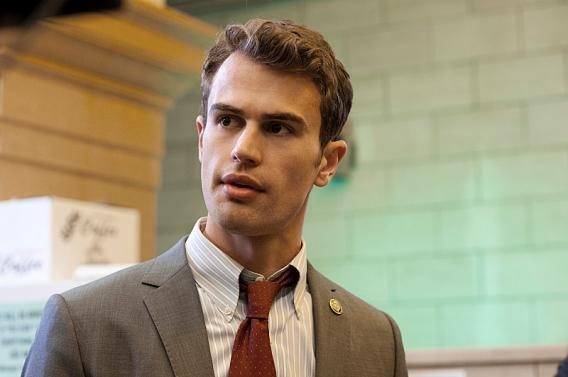Every procedural needs a gimmick these days, and Golden Boy, the new cop drama from CBS that premieres Tuesday night, has a doozy: It transports viewers into the future. Each episode begins and ends with a flash-forward to the time, seven years hence, when 34-year-old Walter Clark (Theo James) is installed as New York City’s youngest police commissioner. After landing this exalted position at an impossibly early age, Clark seems weary and scarred. The series promises to reveal how he came to possess the high office, prematurely gray hair, and a pronounced limp.
Clark is a former street kid who grew up with an addict mom, an absent father, and a troubled younger sister. After only three years on the beat, an act of heroism allows him to parachute into the homicide division, where he serves alongside far more experienced detectives. Seven years from now, Clark will be the city’s top cop. Does he get there thanks to shrewd political maneuvering, exemplary police work, or low-down dirty tricks?
Judging from the first few episodes, the answer is “all of the above.” Clark can be a suck-up and a shameless publicity hound, but he has the makings of a good cop, especially when he listens to his new partner, Don Owen (Chi McBride). If Clark is a show pony, Owen is a workhorse. Just two years shy of retirement, Owen is already making plans for a new life in Florida, but the chance to shape the career of a talented but impulsive young detective revives his own ambition. There’s something comfortingly old-fashioned about this mentor-mentee relationship. For all his drive, Clark still has a lot to learn, and it’s a sign of his potential that he quickly realizes he should heed Owen’s advice.
Of course, not all of Clark’s colleagues in the homicide division are overjoyed to have a new star in their midst. Christian Arroyo (Kevin Alejandro), homicide’s alpha dog until the pup showed up, is threatened by the young upstart. Arroyo’s attempts to sideline Clark’s progress are just as much a part of his education as Owen’s morality tales. They’re the angel and devil on the young cop’s slender shoulders.
Golden Boy’s creator, Nicholas Wootton, says he got the idea for the show while watching The Social Network, a movie about how ferociously ambitious young men with big ideas can overturn long-established ways of doing business. Successful tykes are currently having a moment on television—think singer Juliette Barnes ruling the charts on ABC’s Nashville or reporter Zoe Barnes raising hell on Netflix’s House of Cards. But the Barneses work in fields that have been revolutionized by the Internet. In music and journalism, YouTube, digital downloads, and blogging have smashed career ladders into firewood. So far at least, police work has escaped disruption. No matter how talented, well-connected, or entrepreneurial they may be, detectives are still expected to earn their bones on tough cases. Fortunately, the investigations that provide Clark’s life lessons are as accomplished as you’d expect from Wootton, who spent 11 years on NYPD Blue and a couple of seasons at Law & Order.
Perhaps because he’s 28 and as fit as a fiddle (his best-known role to date is Downton Abbey’s Kemal Pamuk, the Turkish gentleman who died in Lady Mary’s bed), James has to slather on aging makeup and affect a broken gait just to pass for a man in his mid-30s. Consequently, there’s something not quite convincing about the scenes set in the future. And the New York City of 2020 looks a lot like the 2013 version, other than the completed Freedom Tower at 1 World Trade Center, visible from the commissioner’s office.
As much as I would’ve loved to see Manhattanites kitted out in Google Glass, Golden Boy is about the past, not the future. Clark’s journey matters more than his destination. It’s an old-fashioned, low-tech case-of-the-week exploration of the “give me a boy at 7, and I’ll show you the man” philosophy that fuels Michael Apted’s 7 Up series of movies: Give me the golden boy at 27, and I will show you the 34-year-old man in the corner office of 1 Police Plaza. When I look into my own future, I see years spent watching Walter Clark grow up, one hour at a time.
